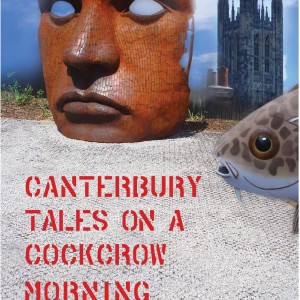Unlike the pilgrims in Chaucer’s Canterbury Tales, the characters in Maggie Harris’ collection of short stories Canterbury Tales on a Cock Crow Morning not only arrive in Canterbury but take up residence in the city. For many, circumstances beyond their control have brought them to this place; indeed more than one character is bemused at finding themselves in such a provincial town. The majority of the characters are at the most only a few generations from being immigrants so flavour the tales with rich dialects and diverse traditions. Yet the actual predicaments they face are universal. Thus we have a concerned parent Mr Wo, proprietor of a Chinese takeaway worried about his spoilt daughter forgetting her own culture; a women’s group inspiring an unhappy wife to make changes in her life; and a woman of a certain age feeling like a street woman as she waits for her lover, a Spanish musician, in the precincts of the cathedral.
Harris has the ability to comfortably inhabit the skins of both her male and female characters. Like all good short story writers she launchers the reader into the heart of the narrative quickly either by establishing a character’s personality and background as in the case of Eliot in ‘This Mother Country Business’ or by taking us into a particular predicament as with the mother in ‘Guitar Hero’ whose thirteen year old daughter has absconded with friends to audition for a music video in a garage in Essex. In many of the tales these are shown to be seminal events in the characters lives. Although short and some are a mere few pages long, these narratives are absorbing.
I feel what makes these tales so unique is the way the characters’ cultural backgrounds colour such events. Thus in ‘Guitar Hero’ the disappearance of the thirteen year old daughter co-incides with the reappearance of Leon the girl’s ‘baby father’ after many years. When Carissa is found in the world of gangster rappers it is Leon, a musician who uses his experience ‘and did the guy thing. The fist shake, the smile, the whisper to the Gatekeeper’ thereby allowing her mother to extricate her daughter from the situation.
Many characters are haunted by memories of their countries of birth. In the eponymous’ A Canterbury Tale on a Cockcrow Morning’ Harris skilfully blends dialect with standard English as the main character’s narrative is interpreted by a friend thereby emphasising the problem immigrants have making themselves understood in another tongue . The need to repress this past is engaged with in ‘This Mother Country Business.’ We are given a brief but telling account of Eliot and his struggle to assimilate and make something of himself in the UK. Having reached a degree of security, a letter from ‘Guyana ‘threatens to shake up Eliot’s life, unopened it is the catalyst for memories of adolescent love that he has striven to bury. In ‘Sugar Water’ we meet Eliot again; elderly now and widowed he has more time to dwell upon his childhood in Guyana as he compares the landscape to that of a dreary rainy Canterbury. He becomes haunted by a red figure selling ‘The Big Issue ‘on the streets. When he inadvertently knocks the girl down he feels compelled to help her because’ not everyone was given a second chance’ and Eliot believes that he was given just that by coming to the UK.
Such serious subjects are not necessarily told in a down beat manner. In many of the narratives Harris blends humour with pathos. Indeed some of the stories, much like the original Canterbury Tales, are absurdly humorous including one with a dog as narrator and in ‘Samantha and The Cockerel’, a battle between the nouveau riche wife of an MP and a farm holder with a particularly vocal cockerel.
The constant in all the stories is Canterbury itself. Harris makes good use of authentic names and landmarks throughout the city which is satisfying for locals and also introduces the city to readers unfamiliar with the place.
Maggie Harris‘s Canterbury Tales on a Cockcrow Morning is published by Cultured Llama, 2012. Order your copy here

